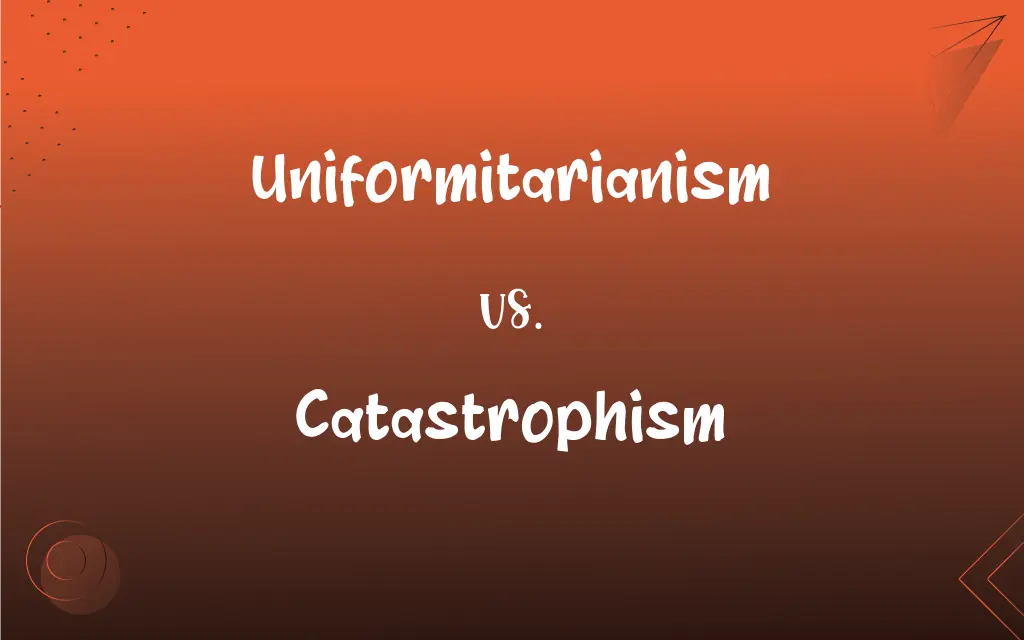Uniformitarianism vs. Catastrophism: What's the Difference?
Edited by Aimie Carlson || By Harlon Moss || Published on January 21, 2024
Uniformitarianism suggests gradual geological processes shape Earth, while catastrophism argues for rapid, catastrophic events causing significant changes.

Key Differences
Uniformitarianism, a concept in geology, proposes that the Earth's features developed through slow, continuous processes over time. Catastrophism, conversely, suggests that Earth's geological landscape has been shaped primarily by sudden, short-lived, violent events, like volcanic eruptions.
Uniformitarianism supports the idea of gradualism, where changes in the Earth's crust are slow and cumulative. Catastrophism argues for rapid, dramatic changes that have a significant and immediate impact on the Earth's surface.
In uniformitarianism, present-day geological processes, such as erosion and sedimentation, are key to understanding the Earth's past. In catastrophism, historical events like floods or asteroid impacts are believed to be the primary drivers of major geological changes.
Uniformitarianism implies a steady, predictable Earth history, aligning with the concept of deep time. Catastrophism, on the other hand, often aligns with a shorter geological timeline, suggesting dramatic shifts over brief periods.
The theory of uniformitarianism has been fundamental in the development of modern geology and the understanding of Earth's age. Catastrophism, while less emphasized in modern geology, still holds relevance in explaining certain abrupt changes in the Earth's geological record.
ADVERTISEMENT
Comparison Chart
Core Belief
Earth's features result from long-term processes
Earth's landscapes shaped by great catastrophes
Timeframe of Changes
Slow and cumulative
Rapid and dramatic
Key Processes
Erosion, sedimentation, and gradual changes
Volcanic eruptions, floods, asteroid impacts
Historical Perspective
Steady, predictable history
Dramatic shifts over brief periods
Modern Geological Relevance
Fundamental in understanding Earth's history
Relevant in explaining abrupt geological changes
ADVERTISEMENT
Uniformitarianism and Catastrophism Definitions
Uniformitarianism
It suggests present-day processes occurred similarly in the past.
Studying river sedimentation today helps understand ancient geological formations under uniformitarianism.
Catastrophism
Catastrophism is the belief that Earth's features are shaped by sudden, large-scale events.
The rapid formation of a canyon by a massive flood exemplifies catastrophism.
Uniformitarianism
Uniformitarianism is the theory of slow, continuous geological processes.
The gradual erosion of mountains over millions of years illustrates uniformitarianism.
Catastrophism
It focuses on natural disasters as primary geological forces.
Catastrophism is used to explain the impact of asteroid collisions on Earth.
Uniformitarianism
It implies gradual, consistent changes shaping Earth's landscape.
The continuous deposition of sediments in deltas is explained by uniformitarianism.
Catastrophism
It contrasts with the gradualism of uniformitarianism.
The sudden collapse of an ice dam causing a massive flood is a catastrophic event.
Uniformitarianism
This theory is key to understanding Earth's long-term geological history.
Uniformitarianism explains the slow development of fossil layers.
Catastrophism
This theory supports a shorter, more dynamic geological timeline.
The sudden extinction of dinosaurs is often cited as a case of catastrophism.
Uniformitarianism
Uniformitarianism underpins the concept of deep time in geology.
The formation of the Grand Canyon is a classic example of uniformitarianism.
Catastrophism
Catastrophism suggests rapid, dramatic changes in Earth's history.
The formation of volcanic islands is a process attributed to catastrophism.
Uniformitarianism
The theory that all geologic phenomena may be explained as the result of existing forces having operated uniformly from the origin of the earth to the present time.
Catastrophism
The doctrine that major changes in the earth's crust result from sudden catastrophes, such as the impact of a large meteor, rather than from gradual evolutionary processes.
Uniformitarianism
The scientific principle that natural processes operated in the past in the same way and at the same rates that they operate today.
Catastrophism
The doctrine that changes in the earth's fauna and flora result from major catastrophic events that cause the die-off of many organisms and are followed by the appearance of new types of organisms.
Uniformitarianism
The uniformitarian doctrine.
Catastrophism
The prediction or expectation of cataclysmic upheaval, as in political or social developments.
Catastrophism
(geology) The doctrine that sudden catastrophes, rather than continuous change, cause the main features of the Earth's crust.
Catastrophism
(biology) The doctrine that, in addition to the more gradual effects of evolution, huge catastrophic events shape the earth's flora and fauna by causing major die-offs which make way for the emergence of new organisms.
Catastrophism
The practice or tendency of catastrophizing, regarding bad things as catastrophic.
Catastrophism
The doctrine that the geological changes in the earth's crust have been caused by the sudden action of violent physical causes; - opposed to the doctrine of uniformism.
FAQs
What is catastrophism?
The belief that Earth's landscapes were shaped primarily by great catastrophes.
What is an example of uniformitarianism?
The slow erosion and formation of river valleys.
How does uniformitarianism explain geological changes?
Through gradual, cumulative processes like erosion and sedimentation.
Is uniformitarianism still relevant in modern geology?
Yes, it's fundamental to understanding Earth's long-term geological history.
What is a key difference between these two theories?
Uniformitarianism emphasizes slow changes, while catastrophism emphasizes sudden events.
What types of events does catastrophism focus on?
Sudden, large-scale events like volcanic eruptions and asteroid impacts.
How did catastrophism view Earth's geological timeline?
As marked by dramatic shifts over brief periods.
Can these theories be integrated?
Modern geology often integrates aspects of both in understanding Earth's history.
What is uniformitarianism?
The theory that Earth's features developed through slow, continuous processes.
How does uniformitarianism explain the formation of mountains?
Through slow processes like tectonic plate movement and erosion.
Can uniformitarianism and catastrophism be applied to other planets?
Yes, these concepts are used in studying the geology of other planets as well.
How do these theories affect the study of fossils?
They provide different contexts for the timing and environment of fossil formation.
Can catastrophism explain all geological features?
No, it's more relevant for explaining certain abrupt changes.
Was catastrophism ever a dominant theory in geology?
Yes, particularly before the acceptance of uniformitarianism.
Has catastrophism been completely disproved?
Not entirely; it's still useful for explaining certain rapid geological events.
Does uniformitarianism consider the impact of large catastrophes?
Yes, but it views them as part of a longer, continuous process.
How do these theories impact the understanding of Earth's age?
Uniformitarianism supports a much older Earth than catastrophism.
What is an example of a catastrophic event?
The asteroid impact that is believed to have caused the extinction of dinosaurs.
What is the role of uniformitarianism in environmental studies?
It helps in predicting future changes based on current geological processes.
Are there modern examples of catastrophic geological events?
Yes, such as tsunamis and large volcanic eruptions.
About Author
Written by
Harlon MossHarlon is a seasoned quality moderator and accomplished content writer for Difference Wiki. An alumnus of the prestigious University of California, he earned his degree in Computer Science. Leveraging his academic background, Harlon brings a meticulous and informed perspective to his work, ensuring content accuracy and excellence.
Edited by
Aimie CarlsonAimie Carlson, holding a master's degree in English literature, is a fervent English language enthusiast. She lends her writing talents to Difference Wiki, a prominent website that specializes in comparisons, offering readers insightful analyses that both captivate and inform.







































































